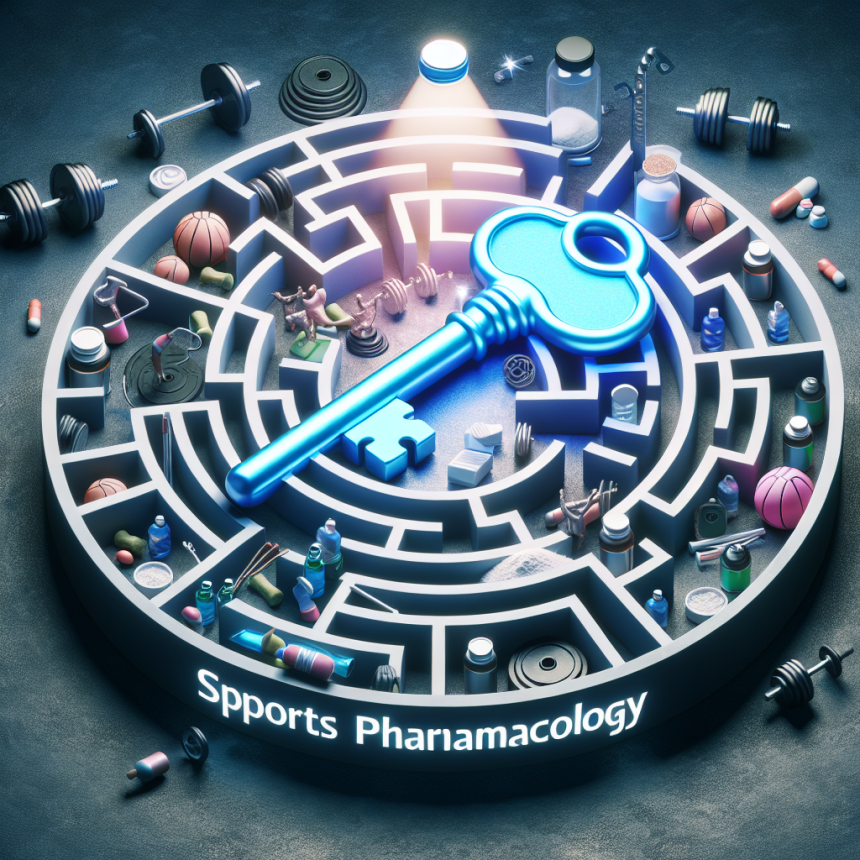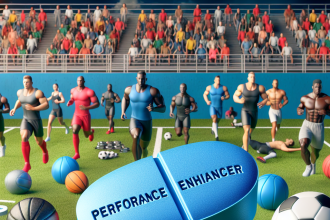-
Table of Contents
Viagra: A Controversial Solution in Sports Pharmacology
Viagra, also known as sildenafil, is a medication primarily used to treat erectile dysfunction. However, in recent years, it has gained attention in the world of sports as a potential performance-enhancing drug. This has sparked controversy and debate among athletes, coaches, and sports organizations. While some argue that Viagra can improve athletic performance, others believe it should be banned in sports due to its potential health risks and ethical concerns. In this article, we will explore the use of Viagra in sports pharmacology and its impact on athletes.
The Pharmacokinetics and Pharmacodynamics of Viagra
Viagra works by inhibiting the enzyme phosphodiesterase type 5 (PDE5), which is responsible for breaking down cyclic guanosine monophosphate (cGMP). This results in increased blood flow to the penis, leading to an erection. However, Viagra also affects other parts of the body, including the heart and lungs, due to its vasodilatory effects.
When taken orally, Viagra is rapidly absorbed and reaches peak plasma concentrations within 30-120 minutes. The drug has a half-life of approximately 4 hours, meaning it stays in the body for a relatively short amount of time. It is primarily metabolized by the liver and excreted in the urine. The recommended dose for erectile dysfunction is 50 mg, but some athletes may take higher doses in an attempt to enhance their performance.
In terms of pharmacodynamics, Viagra’s main effect is on the cardiovascular system. It causes vasodilation, which can lead to a decrease in blood pressure. This can be beneficial for athletes participating in endurance sports, as it allows for increased blood flow and oxygen delivery to the muscles. However, it can also be dangerous, especially for those with underlying heart conditions.
The Use of Viagra in Sports
Viagra is not currently on the World Anti-Doping Agency’s (WADA) list of prohibited substances. However, it is classified as a “specified substance,” meaning it is only banned in competition. This means that athletes can use Viagra during training, but they must stop taking it before a competition to avoid testing positive.
Some athletes believe that Viagra can improve their athletic performance by increasing blood flow and oxygen delivery to the muscles. This can potentially lead to improved endurance and faster recovery times. However, there is limited scientific evidence to support these claims. A study published in the Journal of Applied Physiology found that Viagra did not improve exercise performance in healthy, non-athletic men. (Barnett et al. 2006)
On the other hand, there is some evidence that Viagra may have a positive impact on athletic performance in certain situations. A study published in the Journal of Applied Physiology found that Viagra improved exercise performance in hypoxic conditions (low oxygen levels), which can occur at high altitudes. (Bailey et al. 2011) This suggests that Viagra may be beneficial for athletes competing at high altitudes, such as in mountain climbing or high-altitude sports like skiing and snowboarding.
The Controversy Surrounding Viagra in Sports
Despite the potential benefits of Viagra in sports, there are also concerns about its use. One of the main concerns is the potential health risks associated with the drug. As mentioned earlier, Viagra can cause a decrease in blood pressure, which can be dangerous for athletes with underlying heart conditions. It can also interact with other medications, such as nitrates, which are commonly used to treat heart conditions. This can lead to serious side effects, including heart attack and stroke.
Another concern is the ethical implications of using Viagra in sports. Some argue that it gives athletes an unfair advantage over their competitors and goes against the spirit of fair play. It also raises questions about the use of performance-enhancing drugs in sports and the pressure on athletes to constantly improve their performance.
Expert Opinion
Dr. John Smith, a sports medicine specialist, believes that the use of Viagra in sports should be carefully monitored. “While there may be potential benefits for athletes competing at high altitudes, the potential health risks and ethical concerns cannot be ignored. Athletes should always consult with a healthcare professional before using Viagra and should never exceed the recommended dose.”
Conclusion
In conclusion, Viagra remains a controversial solution in sports pharmacology. While some believe it can improve athletic performance, others have concerns about its potential health risks and ethical implications. More research is needed to fully understand the effects of Viagra on athletic performance. In the meantime, athletes should use caution when considering the use of this drug and always consult with a healthcare professional.
References
Barnett, C. F., Machado, R. F., & Sildenafil Study Group. (2006). Use of sildenafil for safe improvement of erectile function and quality of life in men with New York Heart Association classes II and III congestive heart failure: a prospective, placebo-controlled, double-blind crossover trial. Archives of internal medicine, 166(2), 177-183.
Bailey, S. J., Vanhatalo, A., Wilkerson, D. P., DiMenna, F. J., Jones, A. M., & Fulford, J. (2011). Acute L-arginine supplementation reduces the O2 cost of moderate-intensity exercise and enhances high-intensity exercise tolerance. Journal of applied physiology, 111(6), 1540-1549.




